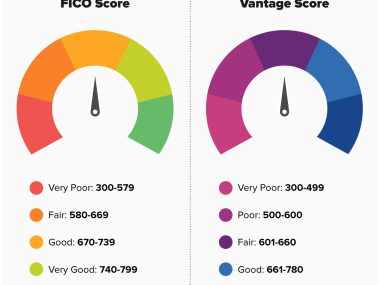When you hear the term credit score, you’re likely to think of hefty financial terms like mortgages, loans, and debt management. But at the base of all these are credit inquiries—crucial to understanding how your credit activities affect the mystical three-digit number.
With our guide, How to Assess the Influence of Credit Inquiries on Your Score, we’ll demystify the sometimes perplexing world of credit checks and how they weigh on your financial standing.
What Is A Credit Inquiry And How Does It Affect My Credit Score?
A credit inquiry, also known as a credit check, is a crucial step in acquiring financial products. It allows lenders to peek into your credit history, gauging how responsible you’ve been with credit in the past. There are two distinct flavours in the credit check world: hard and soft inquiries.
A hard inquiry happens when you go for a loan or credit card, and it’s formal—like signing a contract in a business suit. Although hard inquiries could nick your credit score by a few points, typically fewer than five, they’re just one of the components lenders use to evaluate your creditworthiness.
Don’t fret; hard inquiries are not permanent scars but temporary nicks that fade away as time passes.
Conversely, soft inquiries are the snug pyjamas of credit checks—they’re comfortable and have no effect on your score. These include when you check your own credit or when you receive pre-approved offers.
Here’s how they fit into the grand scheme of things:
- Hard inquiries may decrease your credit score temporarily. They hint that you could be taking on new debt, something that can worry lenders.
- Despite their potential impact, they only account for about 10% of your FICO score.
- If you’re rate shopping for certain loans, such as an auto loan or mortgage, the system is designed to consolidate multiple checks into a single inquiry if they occur within a short time span.
Now let’s get into specifics with a few examples:
- Applying for a new credit card? Expect a hard inquiry.
- Just curious about your credit score? That’s a soft inquiry, and it’s benign.
- Shopping for a home loan? Multiple checks from different lenders over a two-week period can equal one inquiry.
Remember that the drop in your score is generally a small detour—not a roadblock. Within a few months to a year, your credit score is likely to have bounced back to its pre-inquiry figure.
How Many Points Can A Credit Inquiry Potentially Take Off My Credit Score?
Understanding the hit your credit score may take following a credit inquiry involves a bit of number-crunching. A single hard inquiry can lower your score in the ballpark of 5 to 10 points. While seemingly minor, the actual impact depends on your unique credit profile’s strength.
The repercussions of hard inquiries come into the spotlight when you accumulate several in a short time-span—this can make you appear more of a risk to potential lenders. But there’s no need to sweat over soft inquiries, as they strut by without leaving a mark on your credit score.
The effect of a hard inquiry is not everlasting. Just like the changing seasons, the impact lessens over time:
- Its influence is strongest in the initial months, becoming nearly imperceptible as it nears removal from your report after two years.
- By consolidating credit checks for car or mortgage loans within 14 to 45 days, the credit scoring algorithms often view them as a one-time event, softening the blow.
The snapshot looks something like this:
- A hard inquiry may initially shave off a few points from your credit score.
- While the impact diminishes with time, it’s officially wiped from your report after a 24-month period.
- Understanding these dynamics can help you time and plan credit applications to minimise the impact.
So the wisdom here is to shop smart when it’s loan time. Limit applications to a brief window, and rest easy knowing the footprint on your credit score will be equally brief.
What’s The Difference Between A Hard Inquiry And A Soft Inquiry On My Credit Report?
Grasping the distinction between a hard and soft inquiry is key to understanding their varying impact on your credit report.
A hard inquiry springs into action when you officially apply for new credit, like a loan or a credit card. It’s the financial world signalling that you might be taking on more, and this can initially affect your credit score since lenders see it as potential debt.
A soft inquiry, on the other hand, is the unobtrusive bystander that doesn’t influence your score—a background check or that little moment of self-reflection when you check your own credit.
Here are some finer points:
Hard inquiries have a valid ticket to stay on your credit report for two years. Though their hold on your score loosens over time, they’re like a footprint on wet sand—visible for a while before the tide of time washes them away.
Multiple hard inquiries over a short period can unify into a single inquiry punch for loans that usually involve shopping around, like those for cars and homes.
Understanding these differences isn’t just about knowledge—it’s about control. Consent is a pivotal player here; you’re the gatekeeper who allows hard inquiries in, while soft inquiries can happen without your explicit nod.
Take note of how each inquiry plays its part:
Applying for credit? A hard inquiry will follow, and might tap your credit score’s shoulder ever so lightly.
Just glancing through your report or receiving pre-screened offers? These soft inquiries are fans of your privacy and don’t mingle with your score.
Mitigating the impact of hard inquiries takes strategy, but it’s a battle you can undoubtedly win with the right knowledge armour.
How Long Will A Credit Inquiry Stay On My Credit Report?
As far as longevity goes, credit inquiries have a shelf-life too. They comfortably sit on your credit report for a two-year term, but it’s the first year that really counts in the eyes of credit-scoring models.
Distinguishing between hard and soft inquiries remains important:
- A hard inquiry is like a formal handshake—it introduces potential new debt and has a brief but noticeable grip on your credit score.
- Soft inquiries are more like a gentle wave from across the room—they’re acknowledged but don’t disturb your score’s composure.
While they’re not eternal residents on your credit report, hard inquiries have a season where they influence:
- The impression left by a hard inquiry is prominent for a short while, softening as it ages.
- After two years, the inquiry takes its leave, clearing the stage for your ongoing credit activity.
Taking an active role in managing your report is like gardening; you need to keep an eye out for the occasional weed:
- Regularly review your credit report to track all inquiries—authorized or otherwise.
- Ensure there’s no interloper in the form of an unauthorised or fraudulent check, which could cost you credit score points.
Your credit report is a living document, reflecting your financial footprints. By understanding and consequently managing inquiries, you’re essentially steering your credit destiny.
Can I Minimize The Impact Of Credit Inquiries On My Credit Score When Shopping For A Loan?
Minimizing the effect of credit inquiries on your score requires a blend of tact and timing, especially when on the hunt for the perfect loan terms.
Condense your loan shopping timeframe: Algorithms favour the shopper who compares rates swiftly. A concentrated burst of inquiries within a 14 to 45-day span is often treated as one, thereby cushioning your credit score.
Look for pre-qualification options: Many lenders do a soft pull that doesn’t affect your score. Identify these opportunities before you decide on a full application.
Diversify your credit mix: Showing that you can juggle different types of credit can deflect the prominence of individual inquiries on your overall score.
Stellar credit habits always win: Ensuring that bills are paid on time and your balances are more valley than peak can offset the occasional inquiry.
Maintaining credit health with regular report checks is your safety net:
- We all stumble sometimes, but promptly correcting errors on your report will ensure your score doesn’t take an undeserved hit.
- An inquiry might seem inconsequential by itself, but in the complex dance of credit scoring, even small flourishes count.
By taking these strategic steps, you’re essentially playing chess with your financial future—each move calculated for minimal impact and maximum benefit.
Steering Your Credit Score Landscape
Inquiring into the world of credit inquiries reveals a truth: understanding these credit checks empowers you to proactively manage your financial portrait, allowing your credit score to reflect the most accurate picture of your economic behaviour.
Like skilled artisans of their craft, we all can paint our credit stories with strokes that speak of responsible financial planning, timely actions, and informed decisions.
Remember, credit inquiries are but a brief interlude in the symphony of your credit history, and with the knowledge you now hold, you’re well-equipped to ensure their impact is nothing but a gentle note in your broader credit score narrative.






